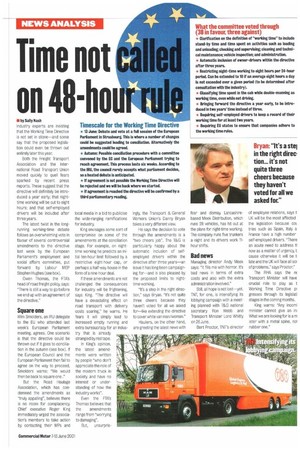Time not on 48-ho
Page 9

If you've noticed an error in this article please click here to report it so we can fix it.
• by Sally Nash Industry experts are insisting that the Working Time Directive is not set in stone—and some say that the proposed legislation could even be thrown out entirely later this year.
Both the Freight Transport Association and the International Road Transport Union moved quickly to quell fears sparked by recent press reports. These suggest that the directive will definitely be introduced a year early: that nighttime working will be cut to eight hours: and that self-employed drivers will be included after three years.
The latest twist in the longrunning working-time debate follows an overwhelming vote in favour of several controversial amendments to the directive last week by the European Parliament's employment and social affairs committee, put forward by Labour MEP Stephen Hughes (see box).
Owen Thomas, the ETA's head of road freight policy, says: "There is still a way to go before we end up with an agreement of the directive."
Square one
Wim Smolders, an IRU delegate to the EU who attended last week's European Parliament meeting, agrees. One scenario is that the directive could be thrown out if it goes to conciliation in the autumn (see box). If the European Council and the European Parliament then fail to agree on the way to proceed, Smolders warns: We would then be back to square one But the Road Haulage Association, which has condemned the amendments as "truly appalling", believes there is no room for complacency. Chief executive Roger King immediately urged the association's members to take action by contacting their MPs and local media in a bid to publicise the wide-ranging ramifications for industry.
King envisages some sort of compromise on some of the amendments at the conciliation stage. For example, on nighttime working he predicts an initial ten-hour limit followed by a restrictive eight-hour cap, or perhaps a half-way house in the form of a nine-hour deal.
If these amendments are not challenged the consequences for industry will be frightening, says King. "The directive will have a devastating effect on road transport with delivery costs soaring," he warns. He fears it will simply lead to increased empty running and extra bureaucracy for an industry that is already strangled by red tape.
In King's opinion, the latest amendments were written by people who don't appreciate the role of the modern truck in society and have no interest or understanding of how the industry works".
Even the ETA's Thomas believes that the amendments range from "worrying to damaging".
But, unsurpris ingly, the Transport 8i, General Workers Union's Danny Bryan takes a very different view.
He says the decision to vote through the amendments is a "two cheers job". The T&G is particularly happy about the automatic inclusion of selfemployed drivers within the directive after three years—an issue it has long been campaigning for—and is also pleased by the proposed limits to nighttime working.
"It's a step in the right direction," says Bryan. It's not quite three cheers because they haven't voted for all we asked for—like extending the directive to cover white van man/woman."
Hauliers, on the other hand, are greeting the latest news with fear and dismay. Lancashirebased Meek Distribution, which runs 28 vehicles, has hit out at the plans for night-time working. The company runs five trunkers a night and its drivers work 11hour shifts.
Bad news
Managing director Andy Meek says: "It fills me with horror. It's bad news in terms of extra costs and also with the extra administration involved."
Still, all hope is not lost—yet. TNT, for one, is intensifying its lobbying campaign with a meeting planned with T8i,G national secretary Ron Webb and Transport Minister Lord Whitty on 26 June.
Bert Proctor, TNT's director
of employee relations, says t UK will be the most affected the legislation because cot tries such as Spain, Italy a France have a high number self-employed drivers. "There an acute need to address tl now as a matter of urgency, t cause otherwise it will be t, late and the UK will face all sor of problems," says Proctor."
The RHA says the rft Transport Minister will have crucial role to play as t Working Time Directive pi grasses through its legislati stages in the coming months.
King warns: "Any incomi minister cannot give an irk What we are looking for is am Lster with a metal spine, noi rubber one.''




































































































